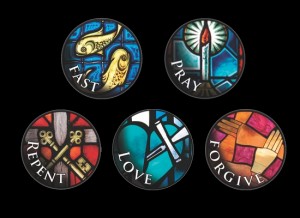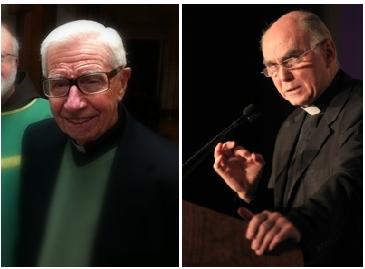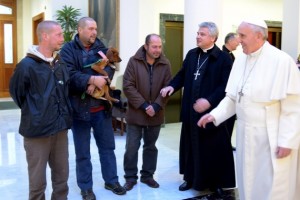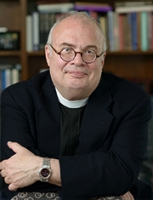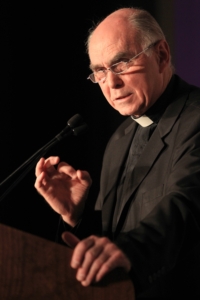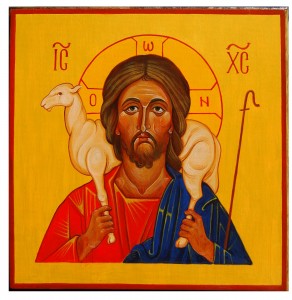 Jesus’ favorite term for Himself was “The Son of Man” – How does this impact Evangelii Gaudium?
Jesus’ favorite term for Himself was “The Son of Man” – How does this impact Evangelii Gaudium?
“The Son of Man” is how Jesus most often refers to himself in the Gospels, 30 times in Matthew, 14 times in Mark, 25 times in Luke and 12 times in John. However the phrase (including the definite article), never appears as such in the Old Testament. So what did Jesus mean when He used this phrase to describe Himself? And what are the implications for all of us?
What does appear in the Old Testament is “son of man” without the definite article (literally “son of adam”); this appears over one hundred times. This usage is what Jesus would have known as He studied scripture. It appears 93 times in Ezekiel, and 14 times elsewhere including in Numbers, Job, Psalms, Isaiah and in a text in Daniel which was originally written in Aramaic (7:13-14). However, its usage in Daniel is very different from how it is used the other 106 times.
In all cases, apart from Daniel, ‘son of man’ appears to refer to our weakness and frailness as human beings. Sometimes it is used as if it is a substitute for a personal pronoun. In the case of Ezekiel, it is used by a divine being to refer to Ezekiel. It appears to be a title referring to the humanity of the author, similar to calling someone human.
The single appearance of “son of man” in Daniel refers to a vision about “the times of the end.” The quotation, “there came with the clouds of the sky ‘one like a son of man’” seems to describe one “like a human being”. Indeed, Jesus seems to be referring to Daniel’s vision when He responds to the High Priest in Mark 14:61: “I am; and you shall see the Son of Man sitting at the right hand of Power, and coming with the clouds of heaven.” Daniel’s usage is favored by Christian interpreters of the phrase whereas Jewish scriptural commentators favor the ‘human being’ meaning.
What is the relevance of all this? In a sense Jesus, in Himself, satisfies both aspects of the phrase’s usage. He is an ordinary human like the rest of us but following His death, resurrection and ascension, He, as the risen Christ, is the fulfilment of Daniel’s vision.
However, Jesus does not simply call Himself, “son of man;” He calls Himself “The Son of Man.” This implies that He is the one and only son of man! Or rather, He is the complete expression of humanity; the model human. Just as all humans are “born of Adam”, Jesus, in Himself, is the representation of all humanity. In a sense He embodies all humanity.
What this means is that when Jesus offers Himself as the Lamb for the Passover sacrifice (whose blood is the mark which ensures that death “passes over” us), then, just as Jesus rose to new life in the Resurrection, so do we! That is what is so tremendously important about the mystery of the Incarnation – Jesus becomes human so we become one with Jesus. What happened to Jesus happens to us. When we suffer Jesus suffers and vice-versa, as Jesus said in Matthew 25:40: “whatever you did for one of the least of these brothers and sisters of mine, you did for me.” The Risen Jesus is eternally present in each of us, He is “I Am”, the eternal now, so a consequence of the Incarnation is that Jesus is as truly present in our ‘brothers and sisters’ as at the Consecration. Every kindness, or meanness, we visit on another we do to Jesus Christ. I am reminded of Hebrews 13:2: “forget not to show love unto strangers; for thereby some have entertained angels unawares.”
Evangelli Gaudium, in my view, is a rallying call to all of us! It is calling us to break free of the prisons we have created for ourselves. Prisons of individualism, of self-reliance, of self absorption, of loneliness, of meaninglessness. Jesus came to set the prisoners free (Luke 4:18 quoting Isaiah 61:1), perhaps we are prisoners in a prison of ourselves? To be free is to accept, indeed welcome, all humanity as our brothers and sisters; all of us are in Jesus Christ our Risen Lord and He is in us. We are members of His body (Ephesians 5:30); and Jesus is one of us, as Jesus clearly states to Paul on the road to Damascus, “I am Jesus whom you persecute!” Jesus makes no distinction between Himself and the Body of Christ; we are one. Recognizing this truth, welcoming it, living it, is what Pope Francis calls us all to do in Evangelli Gaudium. The Joy of the Gospel is to open wide our lives, our hearts, our gifts, our wealth, our time, to share with each other, that is, Jesus for as He said, “Whatever you did not do for one of the least of these, you did not do it to Me” (Matthew 25:45).
 Tuesday, May 6, 6:30 p.m. Social Hall/Chapel
Tuesday, May 6, 6:30 p.m. Social Hall/Chapel

